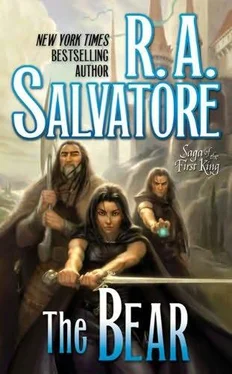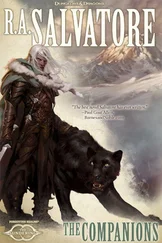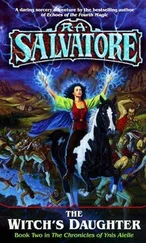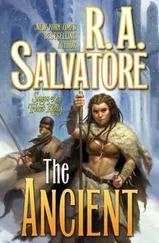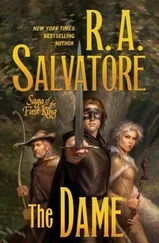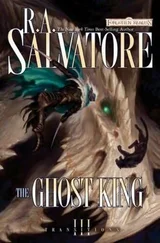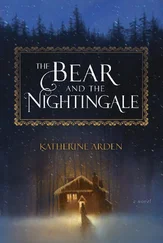R. Salvatore - The Bear
Здесь есть возможность читать онлайн «R. Salvatore - The Bear» весь текст электронной книги совершенно бесплатно (целиком полную версию без сокращений). В некоторых случаях можно слушать аудио, скачать через торрент в формате fb2 и присутствует краткое содержание. Жанр: Фэнтези, на английском языке. Описание произведения, (предисловие) а так же отзывы посетителей доступны на портале библиотеки ЛибКат.
- Название:The Bear
- Автор:
- Жанр:
- Год:неизвестен
- ISBN:нет данных
- Рейтинг книги:3 / 5. Голосов: 1
-
Избранное:Добавить в избранное
- Отзывы:
-
Ваша оценка:
- 60
- 1
- 2
- 3
- 4
- 5
The Bear: краткое содержание, описание и аннотация
Предлагаем к чтению аннотацию, описание, краткое содержание или предисловие (зависит от того, что написал сам автор книги «The Bear»). Если вы не нашли необходимую информацию о книге — напишите в комментариях, мы постараемся отыскать её.
The Bear — читать онлайн бесплатно полную книгу (весь текст) целиком
Ниже представлен текст книги, разбитый по страницам. Система сохранения места последней прочитанной страницы, позволяет с удобством читать онлайн бесплатно книгу «The Bear», без необходимости каждый раз заново искать на чём Вы остановились. Поставьте закладку, и сможете в любой момент перейти на страницу, на которой закончили чтение.
Интервал:
Закладка:
His wife demanded this of him; his unborn child demanded this of him; the Stork demanded this of him.
PART THREE
I knew from the moment I opened my eyes-or rather, from the instant my eyes popped wide-that some deep and unexplored thought had forced itself upon me. It took me a few moments to even recall where I was, there in the quiet room in the dark night. What great comfort was Cadayle's steady breathing in the bed beside me.
We were in our room at St. Mere Abelle the night after the rout of Laird Panlamaris. The next day promised to be full of carrion birds and large graves and the awful smell that had become all too common across the breadth of the land.
And then what?
There was talk of a fleet sailing in, full of Vanguard warriors, ready to march beside Dame Gwydre. There was talk of marching in pursuit of Prince Milwellis and, oh, if another such victory as the one of this morning could be achieved, then wouldn't King Yeslnik run and hide in Castle Delaval?
There was talk of war. It was all the talk, brothers and commoners alike, and despite my report regarding the happenings in the south and Pryd Town, Gwydre and Premujon, Pinower, and all the others still held hope that Bannagran would turn to their side. If he did not, given his skill and the fifteen thousand warriors he commanded, he could likely sweep the field of Gwydre and the force from Honce and of Ethelbert, as well, should that laird come forth.
That terrible truth was the catalyst that had led to the epiphany that had so thrown me from my slumber.
Bannagran of Pryd. He seemed such a simple man, strong of arm and straightforward of intent. He was the consummate general, or the consummate footman; it mattered not what role was thrust upon him.
But did it matter, I wondered, which enemy he was asked to slay?
That was my epiphany: that Bannagran of Pryd was not akin to Affwin Wi. They were greatly similar, of course, for both had spent their lives in training for battle and both served their masters ferociously. But while Affwin Wi did so for personal gain, for gold even, the same could not be said of Bannagran.
For Bannagran, serving Laird Prydae or King Yeslnik or any other is a response to a sense of duty, a belief that such was his place in the world, his purpose in the world.
The Hou-lei tradition is that of the pure mercenary and, thus, strictly amoral by definition. The true incarnation of a Hou-lei warrior is the perfection of the physical and the denial of the emotional. Could Bannagran be said to be a Honce version of Behr's Hou-lei?
No.
I do not even hesitate in answering that question. The man has left too many clues to the contrary. If Affwin Wi were the Dame of Pryd, she would not have let me live when I was captured there recently… or she would have crippled me beyond repair and dragged me to Yeslnik so that he could enjoy my execution.
Affwin Wi would not have allowed the prisoners who were held at Chapel Pryd to don the robes of the order and escape King Yeslnik's sentence of death.
So the question becomes, Why, then, would this man of conscience and honor allow himself to be used as a pawn for immoral men such as Yeslnik?
This dilemma followed me as I slowly crawled out of my bed and moved across the room to the window looking over the chapel's back wall and the dark waters of the gulf.
I found my answer when I first peered out, before I lifted the glass pane and inadvertently viewed my own reflection.
For I see the answer to Bannagran of Pryd when I look into the mirror darkly and honestly.
Always a champion, never a laird, truly, for either of us. We dare to serve and serve extraordinarily well, when duty is thrust upon us, when Bannagran goes to fight Ethelbert and Bransen goes to fight Ancient Badden. But when the path is not determined by someone else of greater authority, then Bannagran balks and Bransen…
I'll never forget the look on my face as I snickered before that glass in the predawn room at St. Mere Abelle. I was naked, figuratively and literally. In the dark of night, in the long shadows, I had nowhere left to hide.
For in the moment of truth and courage, I had run away. I had abandoned Reandu and Cormack and Milkeila and Dame Gwydre's cause and all that I know to be right, because in that moment I had been a coward.
And in following this wicked and "impetulant," as Jameston labeled him, King Yeslnik, so, too, is Bannagran playing the role of the coward. Never on the field of battle, certainly, neither he nor I, but in the realm of responsibility, so alike are we and so cowardly, both.
Would Bannagran admit the truth of himself to himself, I wonder?
And if he did, could he bring himself to march for King Yeslnik?
From the time of Jameston's death, and despite my protests to the contrary, I meandered without purpose. Through the southland and to Pryd, then east with Bannagran and north to St. Mere Abelle, my paths had been a mixture of self-delusion and self-denial, constantly thumbing my nose at the wider world in a pout of superiority and feigned indifference. For the first time since Jameston's murder, looking at my reflection in that dark room, the sound of Cadayle's steady breathing anchoring me, I knew my road.
And I knew the consequence of failure, to myself and to Honce. -BRANSEN GARIBOND
SIXTEEN
Cormack knew better than to question Milkeila's instincts. The shaman had noted something amiss, some movement or sound, perhaps. She paced about their small encampment cautiously, peering into the darkness, holding her solid oaken staff in one hand and the loops of her toothy necklace in the other.
She chanted to the trees and the grass, bidding them to tell her the secrets of those who walked near.
She kept ending her song, though, and turning to Cormack, her expression befuddled. "They tell me of no intruders."
"But you do not believe them?"
"Someone, something, is about," the shaman declared. She swept her gaze across the fields and trees. "I sense it keenly."
She moved to the fire and began chanting again, but this time her call was to the fire itself, strengthening it, brightening it.
Cormack joined her and took out his dagger, though it was more a knife for utility, like cutting kindling, than a serious weapon. "Do you know where?…" he started to ask, but he stopped suddenly and spun about, the hairs on the back of his neck standing up.
"You felt that?" Milkeila whispered, turning beside him.
"Or heard it," Cormack said, unsure which of his senses had told him that there was someone or something near.
Brother Cormack, he heard in his thoughts, not in exact words, but a representation of a greeting by a familiar voice. He recoiled instinctively, mental defenses rushing to the forefront to deny the intrusion. Even as he did that, hardly thinking of it, he sorted out the intrusion and knew, then, the source.
"Brother Giavno!" he said aloud, and Milkeila screwed up her expression curiously.
"Spirit walking!" Cormack explained in a harsh whisper. He nodded as it came clearer to him. "He seeks information so that he might report to Dame Gwydre."
"So we must tell him."
"All of it," said Cormack, and he began, paused, and asked a question instead. "Has Dawson returned to St. Mere Abelle?"
Yes, he heard in his mind.
Now knowing where to properly begin, Cormack started recounting their adventures at Laird Ethelbert's side, of the meeting with Bannagran and Bransen and the loss of Jameston Sequin.
"We have not surrendered the notion of a truce with Laird Bannagran yet," he finished after a few moments. "He seems not an unreasonable man, and Brother Reandu does not support the cause of Father De Guilbe-of that, I am sure."
Читать дальшеИнтервал:
Закладка:
Похожие книги на «The Bear»
Представляем Вашему вниманию похожие книги на «The Bear» списком для выбора. Мы отобрали схожую по названию и смыслу литературу в надежде предоставить читателям больше вариантов отыскать новые, интересные, ещё непрочитанные произведения.
Обсуждение, отзывы о книге «The Bear» и просто собственные мнения читателей. Оставьте ваши комментарии, напишите, что Вы думаете о произведении, его смысле или главных героях. Укажите что конкретно понравилось, а что нет, и почему Вы так считаете.
